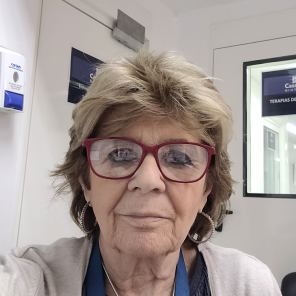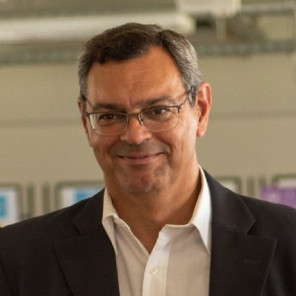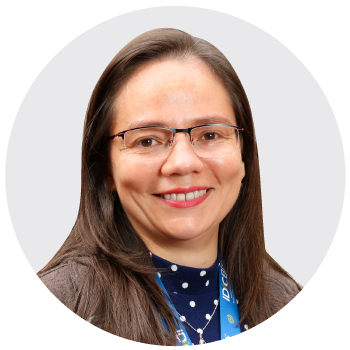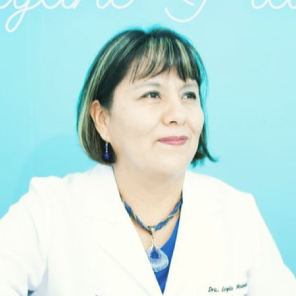ES

THEMATIC BLOCK VII
The future of regenerative medicine: the role of new technologies in regenerative medicine and tissue therapy

Head of the Advanced Therapies Unit
Laboratorio Pablo Cassara Argentina
Dr. Lorenti holds a Bs. in Chemistry from the Faculty of Exact and Natural Sciences at the University of Buenos Aires. She Also holds a PhD from the Faculty of Medicine at the same alma matter. Dr. Lorenti is also certified as a Tissue Bank Specialist by the American Association of Tissue Banks. For over 30 years, she has been working in the field of Tissue Engineering. She participated in the creation of the first Skin Culture Laboratory at the Burn Foundation and served as its director. Dr. Lorenti has held numerous positions, including:
- -Technical Director of the Integrated Tissue Bank (a project that arose from an agreement with the International Atomic Energy Agency)
- -Principal Researcher at the Institute of Basic Sciences and Experimental Medicine of the Italian Hospital of Buenos Aires.
- -Responsible for the Cell Culture, Tissue Banks and Cryopreservation Areas
- -Director of the Cell Culture Area, at the Biotar Foundation, Tissue Bank
- -Director of the Biological Area, Clinical Translation Unit, RyD Tissue Engineering of the Hospital Universitario Austral.

Principal Researcher
Consejo Nacional de Investigaciones Científicas y Técnicas (CONICET) Argentina
Dr. Abraham holds a Bachelor's degree in Chemistry and a PhD in Materials Science from the National University of Mar del Plata (UNMdP) in Argentina. He currently serves as an Associate Professor with exclusive dedication at the UNMdP's Faculty of Engineering, where he teaches undergraduate and postgraduate courses. He is a Principal Researcher of the National Council of Scientific and Technical Research (CONICET) at the Institute of Research in Materials Science and Technology (INTEMA) (UNMdP-CONICET), an institute where he has worked since 1993. Dr. Abraham is an active member of the Latin American Society of Biomaterials, Artificial Organs and Tissue Engineering (SLABO), the Argentine Materials Association (SAM), and the Argentine Society of Bioengineering (SABI). He has also presided over important congresses in Latin America, such as SLAP 2018 and COLAOB 2023. In 2012, he was awarded the Bernardo Houssay Prize from the Ministry of Science, Technology and Productive Innovation of Argentina. In 2016, he was named a Fellow of Biomaterials Science and Engineering (FBSE) by the International Union of Societies for Biomaterials Science and Engineering (IUSBSE), among other distinctions. Dr. Abraham’s main research interests include polymeric biomaterials (synthesis, characterization, properties, applications), polymeric systems for tissue engineering, polymeric and composite nanofibers with applications in tissue engineering and controlled release of bioactive agents using electrohydrodynamic processes and additive manufacturing, surface modification, and encapsulation of bioactive agents.

Scientific Leader of Tissue Engineering, Advanced Therapies Unit
Instituto Distrital de Ciencia, Biotecnología e Innovación en Salud (IDCBIS) Colombia
Dr. Ingrid Siva is a researcher with extensive experience in tissue engineering, cell assays, genetics, molecular biology, and related technical and research writing. A Bacteriology graduate from the University of Santander, she holds a Master's in Genetics from the University of the Andes and a PhD from the Venezuelan Institute for Scientific Research (IVIC).
With her experience in research and health sciences, Dr. Ingrid Silva leads the Tissue Engineering area at IDCBIS. Together with her team, she has led various developments from the Advanced Therapies Unit, including the use of mesenchymal stem cells from umbilical cord as a promising therapeutic alternative for skin regeneration in patients. 3D printing with polylactic acid (PLA) for the repair of musculoskeletal tissue is another highlight, as its architecture and design favor cell migration and prevent muscle invasion, thus contributing to tissue repair. And a variety of projects that include bioengineering of skin tissue and bone tissue, biological scaffolds for skin regeneration, and cell encapsulation for advanced therapy.

Technical Coordinator of the Tissue Bank
INSTITUTO NACIONAL DE SALUD DEL NIÑO DE SAN BORJA (the only Tissue Bank in Peru) Peru
Board-Certified Medical Surgeon specializing in Plastic Surgery from the National Hospital Guillermo Almenara Irigoyen. Since 2001, Dr. Melendez has been performing Pediatric Reconstructive Surgery (cleft lip and palate), both inside and outside Peru. She has completed postgraduate studies in Microsurgery, Endoscopic Surgery, Cell Therapy, and Regenerative Medicine.
Dr Melendez is an associate member of the Peruvian Society of Plastic Surgery and the Peruvian Burn Society. She is also a member of the IPRAS (International Confederation for Plastic, Reconstructive and Aesthetic Surgery), and the International Society for Aesthetic Plastic Surgery (ISAPS).
She has served as the Head Coordinator of the Plastic Surgery Service and as an Attending Physician at the National Cayetano Heredia Hospital for 14 years. She has also been a Professor and Teaching Coordinator of the Plastic Surgery Residency Program at the Peruvian University Cayetano Heredia.

Dean of the Faculty of Sciences
National University of Colombia Colombia
Bachelor's in Pharmaceutical Chemistry from the National University of Colombia. PhD in Microbiology from the Boston University School of Medicine. International Fellow of Tissue Engineering and Regenerative Medicine (FTERM). Member of The Americas Chapter of TERMIS (Tissue Engineering and Regenerative Medicine International Society) Continental Council Members Chapters - Americas.
Full Professor in the Department of Pharmacy, Faculty of Science, National University of Colombia. Dean (2022-2024) of the Faculty of Science, National University of Colombia. Director of the Tissue Engineering Working Group at the National University of Colombia.

Researcher
Instituto de Pesquisas Energéticas e Nucleares (IPEN) Brasil
Dr. Mathor holds a degree in Pharmacy and Biochemistry, as well as a Master's and Doctorate in Basic Nuclear Technology from the Institute of Energy and Nuclear Research - IPEN
Dr. Mathor is a postgraduate program advisor at the University of São Paulo and a researcher at IPEN. Her expertise lies in Morphology, with a focus on Cytology and Cell Biology. Her research interests include: radiosterilization for tissue banks, effects of ionizing radiation on biological tissues, dermal and epidermal substitutes and tissue engineering, skin cell culture, skin-on-a-chip; inactivation of viruses and microorganisms in general by ionizing radiation.
